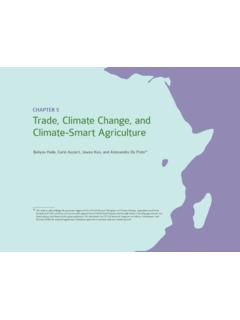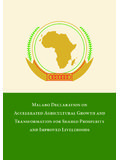Transcription of The 2017 progress report to the Assembly
1 AFRICAN UNION UNION AFRICAINE UNI O AFRICANA P. O. Box 3243, Addis Ababa, ETHIOPIA Tel.: (251-11) 5525849 Fax: (251-11) 5525855 Website: Assembly OF THE UNION Thirtieth (30th) Ordinary Session 28th 29th January 2018 Addis Ababa, ETHIOPIA (DRAFT endorsed by the STC, reviewed after additional country reports submission) Inaugural Biennial Review report of the African Union Commission on the Implementation of the Malabo Declaration on Accelerated Agricultural Growth and Transformation for Shared prosperity and Improved Livelihoods. Assembly Decision ( Assembly /AU/2(XXIII)) of Ju ne 2014 The 2017 progress report to the Assembly Highlights on Intra -African trade for agriculture commodities and services: Risk s and Opportunities Department of Rural Economy and Agriculture (DREA) Page 2 Biennial report to the AU Assembly on implementing the June 2014 Malabo The 2017 report to the January 2018 Assembly Agriculture can be even more than the new oil.
2 One day the oil will run out and Africa will always have its fertile land, its rivers, its youthful workforce and its huge domestic market. Investing now can turn that potential into prosperity. Olusegun Obasanjo, Former President, Nigeria. In low-income countries, where most people work in agriculture, improving agriculture will be important not only for reducing poverty but also for generating economic surplus to support industrialization. Governments need to facilitate the innovation and extension of agricultural technology and improvement of infrastructure for agricultural production and commercialization. Justin Li, Former Vice President, World Bank. Page 3 Biennial report to the AU Assembly on implementing the June 2014 Malabo The 2017 report to the January 2018 Assembly Foreword The African Union Assembly of Heads of State and Government adopted the Comprehensive Africa Agricultural Development Programme (CAADP) in 2003 in Maputo, Mozambique as the Flagship Programme of the African Union for agriculture and food security.
3 The Maputo Declaration on CAADP sets broad targets of 6 percent annual growth in agricultural GDP, and allocation of at least 10 percent of public expenditures to the agricultural sector. From 2003 to 2013, CAADP implementation demonstrated that Africa had well-crafted, home-grown framework guiding policies, strategies and actions for agricultural development and transformation. This was instrumental in raising the profile of agriculture to the centre of development agenda at national, regional and global levels. It also facilitated mobilisation and alignment of multi-stakeholders partnerships and investments around national agriculture and food security investment plans (NAIPs) that have been developed through the CAADP process. In 2013, after a decade of implementation, demand for more clarity was expressed by AU Member States and stakeholders in terms of further elaboration and refinement of the CAADP targets, and assessment of technical efficacies and political feasibilities for success in agricultural transformation.
4 In addition, there was a need to move from planning to effective implementation for results and impact in changing people s lives because most of the NAIPs were not fully implemented. This underperformance was due to various reasons such as inadequate funding, no appropriate institutions and policies, low leadership capacity, weak mutual accountability system and culture, among other. This is why, AU Heads of State and Government adopted the Declaration on Accelerated Agricultural Growth and Transformation (Doc. Assembly /AU/2(XXIII)) in June 2014 in Malabo, Equatorial Guinea. The Malabo Declaration sets the Africa 2025 Vision for Agriculture which is implemented within the Framework of CAADP as a vehicle to implement and achieve the First Ten Year Implementation Plan of Africa s Agenda 2063. Among other commitments, the leaders committed to Mutual Accountability to Results and Actions by conducting a biennial Agricultural Review Process that involves tracking, monitoring and reporting on implementation progress in achieving the provisions of the Malabo Declaration.
5 This Commitment translates, this time, a stronger political will for AU Leaders to effectively achieve Agricultural Growth and Transformation on the Continent by 2025 for improved livelihoods and shared prosperity for African citizens. Therefore, the African Union Commission and the NEPAD Agency together with the Regional Economic Communities (RECs) and Member States, in collaboration with partners designed for the first time ever a Biennial Reporting Mechanism, established a pool of technical experts, helped strengthen the culture of mutual accountability, and developed the Inaugural Biennial report on the Implementation of the Malabo Declaration . Through this report , we are pleased to provide the status of the progress made by Members States of the Union in implementing the Assembly Decision on the Malabo Declaration. We wish to acknowledge the tremendous efforts made by all Member States, despite the numerous challenges faced to increase readiness for providing individual quality country report , and we particularly wish to acknowledge efforts of the Republic of Rwanda for reporting highest performances in 2017 for achieving the Malabo Declaration.
6 On a separate note on behalf of African Union institutions and the Member States, we sincerely wish to thank the development and technical partners including AGRA, FAO, Bill and Melinda Gates Foundation, IFPRI/ReSAKSS, GIZ, World Bank, USAID, AfricaLead, the technical network experts, and CAADP Non State Actors Coalition, for their valuable support in this endeavour. We humbly submit this draft Inaugural Biennial report on progress made for implementing the June 2014 Malabo Declaration on Accelerated Agricultural Growth and Transformation for Shared prosperity and Improved Livelihoods, for consideration by the constituencies of the Union. [Signed COMREA, and CEO NPCA] Page 4 Biennial report to the AU Assembly on implementing the June 2014 Malabo The 2017 report to the January 2018 Assembly Contents FOREWORD .. 3 CONTENTS .. 4 1. INTRODUCTION.
7 5 2. THE 2017 report PREPARATION PROCESS .. 6 3. KEY FINDINGS .. 6 4. PERFORMANCE OF THE REGIONS .. 8 - CENTRAL AFRICA .. 8 - EASTERN AFRICA .. 9 - NORTHERN AFRICA .. 9 - SOUTHERN AFRICA .. 10 - WESTERN AFRICA .. 10 5. HIGHLIGHTS ON INTRA-AFRICAN TRADE FOR AGRICULTURE COMMODITIES AND SERVICES: RISKS AND OPPORTUNITIES .. 11 6. CONCLUSION AND KEY RECOMMENDATIONS .. 11 7. MEMBER STATES INDIVIDUAL PERFORMANCE: THE COUNTRY PERFORMANCE SCORECARDS14 8. ANNEX : DATABASE, RAW COUNTRY DATA .. 15 Page 5 Biennial report to the AU Assembly on implementing the June 2014 Malabo The 2017 report to the January 2018 Assembly 1. Introduction Cognizant of the challenges and opportunities of agriculture and its positive contribution to economic transformation on the Africa Continent, AU leaders adopted Comprehensive Africa Agricultural Development Programme (CAADP) in the Maputo Declaration. After a decade of CAADP implementation, AU Leaders reiterated their engagement to agriculture by adopting the Malabo Declaration on Accelerated Agricultural Growth and Transformation (ref.)
8 : Doc. Assembly /AU/2(XXIII)) in June 2014 in Malabo, Equatorial Guinea. In doing so, AU leaders requested the African Union Commission (AUC) and the NEPAD Planning and Coordinating Agency (NPCA) in collaboration with partner institutions to: (i) develop mechanisms that enhance Africa s capacity for knowledge and data generation and management to strengthen evidence based planning and implementation; (ii) institutionalize a system for peer review that encourages good performance on achievement of progress made in implementing the provisions of this Declaration and recognize biennially exemplary performance through awards; and (iii) conduct on a biennial basis, beginning from year 2017, Agricultural Review Process, and start reporting on progress to the Assembly from its January 2018 Ordinary Session. The seven (7) Malabo Commitments were translated into seven (7) thematic areas of performance: (i) Re-committing to the Principles and Values of the CAADP Process; (ii) Enhancing investment finance in agriculture; (iii) Ending Hunger in Africa by 2025; (iv) Reducing poverty by half, by 2025, through inclusive agricultural growth and transformation; (v) Boosting intra-African trade in agricultural commodities and services; (vi) Enhancing resilience of livelihoods and production systems to climate variability and other related risks; and (vii) Strengthening mutual accountability to actions and results.
9 In this report , twenty-two (23) performance categories and forty three (43) indicators have been defined, for the seven (7) thematic areas of performance aligned to the commitments to evaluate country performance in achieving agricultural growth and transformation goals in Africa. This has been done through a continent wide consultation process. The Inaugural Biennial report on the Implementation of the Malabo Declaration fosters alignment, harmonization and coordination among multi-sectoral efforts and multi-institutional platforms for peer review, mutual learning and mutual accountability. The Member States performances are presented in a form of a Country Scorecard in implementing the Malabo Commitments covering the period 2015 - 2016. The report aims at strengthening national and regional institutional capacity for agriculture data generation and knowledge management which will, not only support improved evidence based planning, implementation, monitoring and evaluation, and learning; but also set basis and paths for triggering continental actions programmes to collectively drive agriculture transformation in Africa.
10 The findings and recommendations of the Biennial report should, therefore, allow AU Leaders to appreciate the amount of efforts required to strive towards the set targets for 2025 in the Malabo Declaration, and then endorse the appropriate collective actions to accelerate agricultural growth and transformation. The report highlights the inclusive nature of the process and methodological approach that was used to collect and analyse data and develop the report . Furthermore, the report also presents the key findings at continental and regional levels, the detailed profiles and scorecards of individual countries, and sets of recommendations for individual countries, regional bodies and continental institutions. Page 6 Biennial report to the AU Assembly on implementing the June 2014 Malabo The 2017 report to the January 2018 Assembly 2. The 2017 report Preparation Process A Biennial Review Team was established to technically guide the overall design of the Biennial Review Reporting Mechanism and develop the report .






